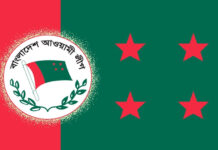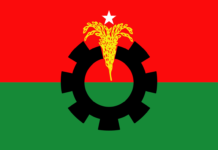 An anti-coup protester displays defaced images of commander-in-chief Gen. Min Aung Hlaing in Mandalay, Myanmar, March 3, 2021 (AP Photo).
An anti-coup protester displays defaced images of commander-in-chief Gen. Min Aung Hlaing in Mandalay, Myanmar, March 3, 2021 (AP Photo).Sanctions are in the air everywhere these days. Just this week, there was a ratcheting up of sanctions, travel bans and asset freezes against the military juntas in Myanmar and Mali, almost certainly to be followed by sanctions against military leaders in Burkina Faso, who overthrew that country’s democratically elected government last week. Meanwhile, the U.S. Congress moved one step closer to passing a raft of new sanctions on the Sudanese military for its October coup. Then, of course, there are the very serious threats by the U.S. and its NATO allies to impose wider sanctions against Russian President Vladimir Putin or on the Russian economy if Russia invades Ukraine.
There are two notable features of this slew of sanctions. First, none of them involve the United Nations. Most were imposed unilaterally by the United States and its Western allies, including the United Kingdom, Canada and the European Union or its individual member states. Regional organizations in Africa—the African Union and the Economic Coordination Organization of West African States—have also been stepping up, suspending the membership of certain coup governments or designating new regional travel bans, asset freezes and other sanctions on select military officials.
There have been efforts to bring each of these crises to the U.N. Security Council for more forceful condemnations, comprehensive arms embargos and sanctions—but to increasingly little effect. Vetoes and blocks at the U.N. are of course not new. But these days, the objections are no longer confined to a few flashpoint countries like Syria. Instead, they seem to encompass any number of crises and regions. As a result, U.N. member states have turned to the only tools that seem to be left: unilateral or regionally coordinated sanctions.
The second important trend here is that the vast majority of these measures are so-called targeted or individual sanctions, aimed either at particular political leaders and their close associates or at companies, assets and individuals involved in offenses like arms trafficking, state repression and cyberattacks. Similar measures have long been used to target individuals and groups in the counterterrorism realm, but the practice has expanded in the past decade, with new measures targeting state actors and spanning a range of foreign policy issues beyond counterterrorism.
With respect to Russia alone, as of last month the U.S. had imposed sanctions on “at least 735 individuals, entities, vessels, and aircraft” related to Russia’s occupation of Crimea and 68 individuals related to election interference in the United States. It had also sanctioned some 54 individuals for their involvement in human rights abuses and corruption using the 2012 Magnitsky Act, a Russia-specific sanctioning mechanism. The U.S., EU and U.K. together have also sanctioned Russian officials or companies in relation to the poisonings of Russian double agent Sergei Skripal in 2018 and opposition activist Alexei Navalny in 2021, as well as for arms embargo violations and other activities of Russian mercenaries in Libya and elsewhere.
Targeted sanctions for human rights violations and corruption have been a particular growth area. In 2016, the U.S. Magnitsky Act, which was originally specific to Russia, went global, giving the U.S. government authority to impose sanctions, visa restrictions, asset freezes or other penalties on targets anywhere in the world. These sorts of designations and blocks have soared under U.S. President Joe Biden’s administration, which issued 173 designations under the Magnitsky Act in 2021, compared to the 12 issued in 2020. In particular, visa bans “have become one of the Biden administration’s preferred tools for punishing bad actors abroad,” according to Benjamin Press, a research assistant who tracks these issues for the Carnegie Endowment for International Peace.
Nor is the U.S. alone in this. Canada, the U.K., the EU, Estonia, Latvia, Lithuania and most recently Australia have also adopted their own versions of the Magnitsky Act. These countries have tended to enact their human rights or corruption-related sanctions in tandem to increase their effect, as they did in response to the 2018 killing of Saudi dissident and Washington Post columnist Jamal Khashoggi, the 2021 military coup in Myanmar, the 2020 crackdown against protesters in Belarus and the continued persecution of Uyghurs in China.
Stepping up unilateral or regional sanctions on bad actors may feel like the best that can be done in a climate of U.N. Security Council inaction—but they often fail to get results.
Stepping up unilateral or regional sanctions on bad actors may feel like the best that can be done in a climate of U.N. Security Council inaction—but they often fail to get results. Targeted sanctions are most effective in shifting or deterring bad behavior when they are tied to specific and clearly identified objectives and when the pressure exerted is both substantial and targeted in ways that shift the incentives or disincentives for engaging in the offenses they are intended to stop. These conditions have not been present for most of the recent sanctions.
Targeted sanctions have proven useful, for instance, in bringing warring parties to the negotiating table, shifting incentives to fight or reinforcing existing commitments during peace talks or mediation. But the type of sanctions the U.S. and its allies use rarely impose high enough costs to get the targets to change or deter their behavior. In part, this is because terrorists, would-be putschists, gun-runners and corrupt officials usually operate through elaborate networks and illicit financial avenues that are hard to cut off through formal mechanisms, especially narrow ones. In general, the narrower the sanction, the easier it is to evade.
One international sanctions expert I spoke to gave the example of a U.S.-sanctioned militia leader in Iraq. Because Iraqi militia leaders are so deeply networked and embedded across the Iraqi state and society, the U.S. would have to freeze the assets of or put blocks on some 200 individuals to have any impact on this one militia leader’s activities, the official estimated. Similarly, unilateral or regional sanctions simply don’t have the heft of universal sanctions, making them that much easier to sidestep. Coup leaders in Mali, Myanmar or Sudan may smart from Western sanctions, but they know they can still rely on China for trade and investment deals and Russia for additional arms and security assistance.
The new targeted sanctions are also usually imposed without clear benchmarks and often outside of mediation processes. Where they are part of a negotiation, the sanctions are not timed in ways that would be likely to shift the incentives within that dialogue. Human rights and corruption-related sanctions are particularly weak on this front. Although some are clearly tied to particular offenses or abuse, others are part of a regular process of designation and announced without attention to their timing. In some cases, sanctions have targeted such low-level officials that it is hard to see how they would deter any would-be orchestraters of mass abuses or corrupt enterprises.
And there are serious costs to failure here. Announcing sanctions and travel bans certainly has an immediate rhetorical value, but if again and again they fail to levy real costs for their targets, these measures will lose credibility over time. That would leave the West with fewer tools for preventing security threats and rights transgressions in the future. The current crisis over Ukraine is a case in point. Given the number of sanctions already on Russian officials and businesses, the U.S. threat to impose new sanctions carries less weight than it might have 10 years ago. The fact that Putin has had eight years to sanction-proof the Russian economy doesn’t help.
Ineffective or poorly targeted sanctions could also inadvertently undermine the very principles that they are intended to protect. The sheer number of individuals who would have to be sanctioned in order for the Magnitsky laws to be applied equally means that selective application is inevitable. But punishing some and not others for violating supposedly universal values plays into the Russian and Chinese narrative that appeals to human rights and democracy are merely excuses Western states use to advance their agendas. The fact that former U.S. President Donald Trump repurposed Magnitsky designations to undermine strategic rivals—for example, using the law to sanction Iran-linked groups and figures in Iraq and Lebanon—further tarnishes the brand.
A final risk is that the knee-jerk reaction to impose sanctions could exacerbate political and geopolitical tensions. For instance, U.S. sanctions, visa restrictions, embassy closures and other measures targeted at Chinese officials and entities have triggered tit-for-tat retaliations from Beijing. In the end, the strategy not only failed to compel China to change its behavior, but worsened U.S.-China tensions. Or for another example, look to Iran, where the Trump administration’s bevy of sanctions on Iranian generals, agencies and corporations led to a dangerous outbreak of hostilities over the course of 2019.
With each new crisis, coup and corresponding sanction regime, the world is increasingly being carved up into those countries that enjoy Western recognition, aid and trade, and those that do not. Some analysts have argued that the widely feared “new Cold War” has been driving countries to resort more often to unilateral or regional sanctions. But the reverse may also be true. Rather than reinforcing a rules-based international order, targeted sanctions could be laying the groundwork for that new Cold War division, splitting the world into competing blocs and spheres of influence.
Erica Gaston is a guest columnist filling in for Stewart Patrick every other Monday. She is the senior policy adviser and head of the Conflict Prevention and Sustaining Peace Program at the United Nations University Center for Policy Research. She previously worked for 15 years as a practitioner, lawyer and conflict analyst on issues of conflict-related human rights and civilian protection, and has significant field experience in Afghanistan, Iraq, Yemen, Syria and Pakistan, among others.









